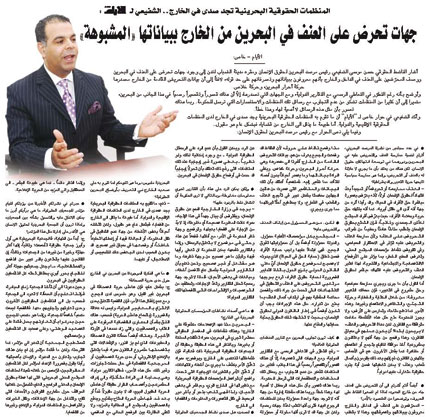
|
 |
 |
|
|
|
|
|
|
|
|
|
|
|
|
|
|
|
|
|
|
|
|
|
|
Al Ayam Newspaper Interviews Hasan Shafaie:No Connection between Violence and Freedom of ExpressionIn an interview with Al Ayam newspaper on 30 September 2009, human rights activist Hasan Shafaie pointed out that there is a difference between freedom of expression, peaceful political performance and inciting violence. He added that inciting, encouraging or getting involved in violence violates human rights. This is so because violence directly threatens lives and also violates personal freedom and the right to live safely. In addition to this human rights requires a peaceful atmosphere away from violence which affects political stability and undermines the activity of civil society institutions. Harming the peace and stability of any country affects it economically, socially and even its development.
Mr. Shafaie also added that riots and the use of burning bombs are not correct methods of expressing opinion. Rather, freedom of speech, writing and assembly should be used to voice one’s opinion, as well as demonstrations and protests etc. Mr. Shafaie also pointed out the fact that all the above are available and allowed in Bahrain, and that the Government should not prohibit such activities as long as they comply with the law. He also said that advocates of violence do not complain about the lack of freedom of expression as, initially, they are not interested in working within the law; especially as they do not believe in the legitimacy of state, in other words, they violate the law and then get involved in riots and violence which cannot be covered by any international human rights norms. Replying to the question: who’s behind the incitement of violence? Mr. Shafaie stated that the instigators are known by their statements and actions. He said that Harkat Ahrar al-Bahrain ( Bahrain Freedom Movement) and Harakat Khalas (Salvation Movement) are the main sources of inciting statements that come from abroad. According to Mr. Shafaie, public statements and leaflets issued by the two actors have contributed significantly to fuel violence and riots in the street. He stressed that society with all its civil society institutions are also responsible. Furthermore, the Government also bears responsibility for the protection of its people within the context of (the protection of the right to live). He explained that International law demands that countries take the necessary procedures to protect its citizens’ rights in order to deter advocates of violence; and also investigate any human rights violation as well as ensure that those responsible are brought to justice. It is important that such procedures take place within the international human rights law so that these rights are not violated with the excuse of protecting them. Mr. Shafaie criticized the Government’s performance with regards to dealing with international human rights reports and said that a modest progress was achieved in this aspect. He also pointed out that many organizations are complaining that the Government does not respond to their letters and inquiries. Mr. Shafaie attributed this inadequate official response to misjudging the importance of the matter and also to some administrative problems including the lack of having one entity in place that organizations can refer to. Mr. Shafaie stressed that not responding to international human rights correspondences portrays a negative image about Bahrain. With regard to the role of Bahraini civil society organizations and the impact of their activity abroad, Mr. Shafaie stated that their work has had a good response abroad, and that Bahrain is no longer a closed country. These organizations play the role of a mediator for sending views and information to foreign media which can be sometimes politicized or hasty. |
